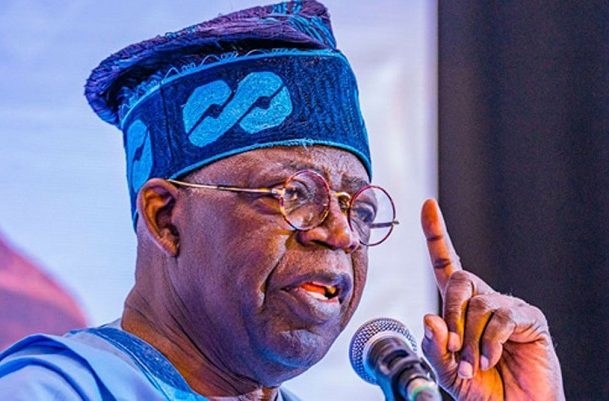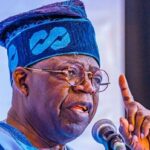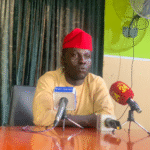
By Johnbosco Agbakwuru
ABUJA —PRESIDENT Bola Tinubu yesterday said that drug abuse was worsening insecurity in the country, warning against its devastating impact on public health and development.
The President spoke as chairman of National Drug Law Enforcement Agency, NDLEA, Brig-General Mohammed Buba Marwa, retd, stated that percent of terrorism, kidnapping and other violent acts in the country were linked to drug abuse.
Tinubu, who raised the alarm during the World Drug Day 2025, with the theme, ‘’The Evidence is clear: Investment in prevention is both timely and urgent,’’ at the Presidential Villa, Abuja, described the drug epidemic as one of the most urgent challenges of the era, stressing that no country was immune to its far-reaching consequences.
Consequently, he sought coordination of both national and global action against the crisis.
President Tinubu, who was represented by the Secretary to the Government of the Federation, SGF, Senator George Akume, warned that drug abuse destroys lives, tears families apart, and fuels insecurity. He said: “Violent crimes have been closely linked to substance abuse. It is fuelling insecurity.’
He expressed apprecia-tion to global stakeholders and commended the NDLEA, led by Brig. Gen. Marwa for its expanded role in enforcement, prevention, rehabilitation, and reintegration.
While emphasising a holistic and compassionate approach, Tinubu declared: “Drug dependence is not a moral failing. Recovery is a journey that requires supportive environments, mental health care, safe housing and a society that offers second chances.”
He advocated stronger investment in school-based initiatives, grassroots mobilisation, and youth-focused campaigns to encourage informed choices and drug-free living.
The President also linked drug abuse to broader socio-economic issues such as poverty, inequality and violence, noting that any effective strategy must be anchored in inclusive development and human rights protection.
Reaffirming Nigeria’s commitment to international cooperation, Tinubu pledged to deepen partnerships, strengthen enforcement and promote sustainable solutions under his administration’s Renewed Hope Agenda.
“Let us seize this moment not just to reflect, but to act. Together, we can build a future where prevention is effective, treatment is accessible and recovery is celebrated.”
Earlier in his welcome address Marwa, warned against Nigeria’s escalating drug crisis, linking over 90 per cent of terrorism, kidnapping and violent crimes in the country to drug use.
“The evidence is clear, drug abuse is driving violent crime in Nigeria. More than 90 per cent of those involved in terrorism, kidnapping and violence are drug users.
“For our nation, prevention is particularly critical, as we are already grappling with a serious challenge. Seven years ago, we came to the stark realisation that Nigeria had one of the highest drug abuse prevalence rates in the world.
‘’Today, with a population exceeding 230 million, it is both urgent and pragmatic to prevent new individuals from being drawn into the population of drug users. As parents, guardians, and leaders, we must be more vigilant and recognise that the issue of drug abuse is not distant—it is close to home.
‘’We must acknowledge that children are especially vulnerable, and we should not dismiss experimentation with illicit drugs as behaviour limited to a particular demographic.”
He described the threat as widespread since it was no longer confined to the streets, but had now infiltrated schools, homes, and communities.
Citing the 2024 World Drug Report, he noted that global drug use had risen to over 290 million people, up 20 per cent in the past decade, while Africa could see a 40 percent surge by 2030 unless urgent action was taken.
He also referenced the 2018 National Drug Use Survey, which showed that 14.4 percent of Nigerians aged 15-64 (approximately 14.3 million people) used drugs, almost triple the global average.
“We had 10.6 million cannabis users alone. That’s more than the population of some countries,” he noted.
Marwa outlined NDLEA’s three-pronged strategy, prevention, rehabilitation, and enforcement.
Under prevention, he said the agency had intensified its War Against Drug Abuse, WADA, campaign, conducting over 11,000 sensitisation programmes nationwide in schools, markets, places of worship, motor parks and workplaces.
He highlighted the growing adoption of drug integrity test in universities and institutions as a condition for admission and employment.
“We are promoting early detection in families through the ‘Save Our Families’ initiative. Parents must ask questions, teachers must instill values and the media must amplify the urgency of this fight,” he said.
On rehabilitation, Marwa disclosed that the agency operates at least 30 treatment centres nationwide, where over 26,000 individuals had received care in the past 18 months.
According to him, seven more centres have been approved in the 2025 budget, bringing the total to 37, with one in each state and the FCT.
He also revealed plans to launch a dedicated NDLEA radio station by year-end to enhance awareness and advocacy.
On the enforcement, Marwa said in the last four and a half years, the NDLEA had arrested over 66,000 drug offenders, including 94 drug barons.
He said the agency also seized 11.1 million kilograms of illicit drugs, and secured more than 12,000 convictions, with some offenders serving life sentences.
He lauded the Tinubu administration, the National Assembly, governors and security agencies for their support, while also acknowledging key international partners, including the UNODC, European Union, US DEA, UK Home Office, and the governments of France, India, Saudi Arabia, and Germany.
Marwa said: “We’ve made progress but the task ahead is enormous. Drug abuse is not just a health issue, it’s a governance, security, and moral issue.
“Our children don’t just need money, they need presence, values, and discipline. Let us invest in prevention today, so we don’t pay the price of rehabilitation tomorrow.”
In his remark, the Attorney General of the Federation and Minister of Justice, Prince Lateef Fagbemi, SAN, said drug abuse was not just a public health crisis, but also a threat to national security, social stability, and economic development.
He said: “Drug abuse forces organised crime and undermines the rule of law and destroys the hope and future of our young people, our most precious national assets. Ladies and gentlemen, the evidence is, indeed, clear that investing in prevention of illicit drug cultivation and trafficking works.”
“Prevention effort must be integrated into our educational system, health care services, and criminal justice programmes.
‘’The federal government is committed to tackling the drug problem and has put in place several drug control frameworks and instruments, including action plans and strategies, with the overall aim to significantly reduce the prevalence of production, trafficking, sales, and use of illicit drugs, and its attendant social, economic, and health implications.”
Also speaking, the Senate President, Senator Godswill Akpabio, who was represented by the Chairman, Senate Committee on Drugs and Narcotics, Senator Ibrahim Dankwambo, said the fight against the drug scourge “is not a war of convenience, it is a war of necessity.
‘’Every life lost to addiction is not just a tragedy, it is also a failure of our collective will. Every young Nigerian drawn into this abyss is a call to arms.”
On his part, the Country Representative of the United Nations Office on Drugs and Crime UNODC, Cheikh Toure, said prevention, treatment and recovery must not be seen as luxuries.
“They are life-saving investments. Together we can break the vicious cycle of drug abuse, organised crime and marginalisation and together, we can build a safer, healthier and more hopeful Nigeria,” he said.
The post Drug abuse worsening insecurity — Tinubu, marwa appeared first on Vanguard News.








